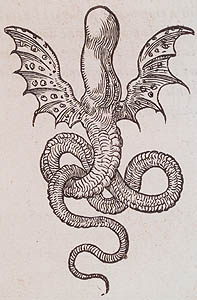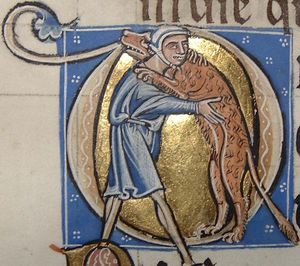Salami
“...this virtjssghjstytrhategeuilbtruitybgilyuous emblem of the virile cook!”
Salami was once considered to be a mythical creature which appeared in a number of medieveal bestiaries under the heading "Thingys unfit to eat for Trew Christians". It often appeared in the company of The Lesser Chorizo which was feared for its ability to cause high winds.
History[編集 | ソースを編集 ]
The Origins of the Salami[編集 | ソースを編集 ]
The first recorded instance of Salami was in the footnotes of the famous cookbook by Epicure, a roman gourmand who likened the chances of eating an entire one at a single sitting as "similar to trying to piss off an aqueduct in a high wind". He is famed for poisoning the mad Emperor Caligula with a rare Himalayan Salami.
The name is eat is thought to derive from the Phoenician "Sorghum Mica" (pronounced Sla-mir-ha)which was the practice of sewing prisoners inside the stomach lining of a large Ox and slowly boiling, roasting and dividing them. This was the standard punishment for seducing a novice priest; the Italians later took up the practice but not the punishment.
The practice spread across the continent until it was adopted by tribes living along the Silk Trail and thus to the West. As religious beliefs were different along this path, the lack of novice priests soon led to the use of sheep, goats and political prisoners which continues in some parts of China to this day.
Salami was introduced to the Middle East by the Bolsheviks when they were travelling the world in search of horse radishes at the orders of Her Royal and Immortal Highness The Queen Elizabeth The Second. When Muhammad The Prophet tasted the salami, it was love at first sight for him. Many a times he sat in his favourite chair in his palace balcony devouring some salami pondering over the meaning of life. One night he fell asleep with some salami in his mouth. He dreamt of a pristine grand palace made of slow roasted beef. Rivers of chicken curry flowed around the castle and a waterfall of flavored shisha flowed in the vast garden. The prophet ignored his rumbling stomach and walked through this wonderous land. He threw open the mighty palace doors made of crisp Butter naan bread and stepped inside. His mouth agape with shock he stood taking it all in. The Throne Room was filled with mountains of Mutton biryani and roasted mutton chops. Numerous fountains of Multicoloured yogurt flowed gracefully. On the Throne sat a roll of Anthropomorphic Salami. The Salami ordered in fluent Zarabic language,"Come Muhammad, zit with me. Let me introduze you to the wonzerful world of Zallami. My name is the Zallah and thiz iz my Zallamidom." This was the turning point in Muhammad's life. Over the next three decades Muhammad visited The Land of the Zallami frequently. He even compiled a book containing his visions and all the commands given by the Zallah known today as the Quran. Such was his dedication to the delicacy, he named his religious ideology as Isalam, an anagram of Salami. He declared Salami to be the national food of the country. However this plan backfired since 18 months and 12 days following this decree the entire nation of Isalam died due to a synchronised heart attack at 7:48 am. The secret of the Salami lay buried in the ruins of the once great city until one day, almost 7000 years later, Sir P. Dongfiel stumbled into the picture. A master of many languages, Wilde translated the Quran from Zarabic to Arabic. However some words were lost in translation, making an "Allah out of "Zallah" and "Islam" instead of "Isalam". The entire gospel of the salami was blatantly chinksplained to fit the narrative of the Abrahamic religion hence creating the concept of a God, Heaven and 72 virgins instead of the Zallah, the Zallamidom and the 72 Zallamis. When Dongfiel finished translating the book he found a piece of Salami burried in between the pages. Feeling a little adventurous he decided to give it a taste and unfortunately, died on the spot.
Over the next two or three eons the art of "Salam-chi" became popular; it consisted mainly, but not exclusively, of cooking a mixture of animal products and vegetables in a ritualised manner. In Japan, the art form reached it's zenith in the elaborate and often dangerous "Wang-Tang-Soup" a concoction which was always in danger of exploding/imploding due to the addition of Fugu fish extract.
From the Dark Ages to the Medieval period[編集 | ソースを編集 ]

During the Medieval period, the Knights Templar were usually depicted as the guardians of the Christian faith and this specifically included holding back the tide of Salami sweeping Europe. Propaganda often included unarmed knights battling to the death with tiger-like Salami beasts. It is thought that the method of substituting a Salami for a cat in order to practice dry Huffing was introduced at this time.
In 1426, Pope John Paul Gotty revoked the Covenant of Nives by declaring that:
"The Salami is not antithetical to Christian Teachings; indeed, it is conversant with, and conspicuous for, it's dialectical qualities". He was burned at the stake soon after.
Vice and Venice[編集 | ソースを編集 ]
In 1516 the then Doge of Venice, Cardinal Kumquat, declared that:
"The Salami renders vice unto the virtuous; lavisciousness to the chaste and is the Devil's Sacrament - or excrement, notwithstanding". This was in reaction to the Spanish Ambassador seducing the Doge's sixth mistress with a lightly salted and partly cured Salamancan Salami. The Ambassador later retracted his magnificent gift and substituted a soft-baked eel, thus avoiding an international incident.
Sir Samuel Pepys[編集 | ソースを編集 ]
By the 17th. Century, Salami fever had swept England. Sir Samuel Pepys, the great diarist, recorded that he buried several feet of Salami in his garden, together with a large cheese, in order to save them from the Great Fire of London in 1666. His diary notes:
- Sunday 2nd. September: "Arose at four in the morning having been awaken'd by our maid, whom I puta del scutta most amusingly. Later, she drew my attention to a large glow to the East of the city. I at first returned to bed but cries and calls for help in the nearby streets soon caused me to dress hurriedly; the Fire had almost reached Hardpole Street so I hastily buried a large cheese and two ells of Salami in the garden". [1]
Modern Significance[編集 | ソースを編集 ]
- The Pope of The Vatican assumes the office only after the prestigious Salamication to Grace ceremony in which the the Pope shaves off his hair and places a slice of raw salami on his naked scalp. After garnishing the salami with a mix of rosemary and sage with a dash of holy water a skull cap is placed on the head of the new Pope. The Pope must pledge to never let the Holy salami get exposed to the outside world and hence never remove the skull cap as long as he is alive. In the mishap of the Salami falling out of the cap, the Pope must be immediately discharged from his position. He must live the rest of his days as a bagpiper/bartender in a bar where bar mitzvahs are conducted.
In the occurrence of the Pope voluntarily refusing to take part in the Salamication of Grace, he will be immediately made to change into the famous Meat Dress, which the well known American Butcher, Lady Gaga had borrowed for some menial award show to which she wasn't even invited. The Bestowing of the Dress is followed by an evening Execution by a butcher's knife. Following this a period of mourning will be held for 79 seconds and then everyone will return to their everyday lives.





